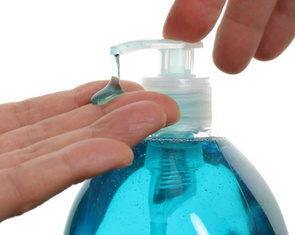In the quest of killing hazardous bacteria, antibacterial hand soaps are claiming a slice of the market. Bacteria can be hazardous and it remains a fact, that hand washing is an effective way to eliminate harmful bugs. It is not the quick, five-second wash under the water tab that gets rid of the bugs. The old trick of telling kids to sing the “ABC Song” while washing their hands with soap and water still has some merit: you need 20 to 30 seconds of washing and rinsing to combat bacteria effectively.
In the meantime Researchers at the John Hopkins Bloomberg School of Public Health report, that the antibacterial agent in hand soaps, triclocarban, is not without risk. Triclocarban, commercially known as TCC, is a pesticide and is used extensively in soaps and body washes. One commercial survey found it in 30% of bar soaps. If it sounds questionable to the consumer to wash hands or body with a product that contains a pesticide, it rings even more alarm bells with scientists that observe the impact of the product on the environment. After 19 days of treatment time in the sewage treatment plant, 76 % of the ingredient is still present in the treated sludge. Treated sludge is later used as a fertilizer! Triclocarban is toxic when ingested and is part of toxic waste. After reviewing all these facts, the consumer has to make the decision whether overkill with antibacterial hand soaps is such a good idea.
Reading product labels and sticking to less toxic products may very well be the more sensible choice.
More information about:
1. Toxins in the bathroom: https://www.askdrray.com/toxins-in-the-bathroom/
2. Detoxification: https://www.askdrray.com/get-rid-of-toxins-safely/
Reference: The Medical Post, May 16, 2006, page 47
Last edited Nov. 1, 2014






